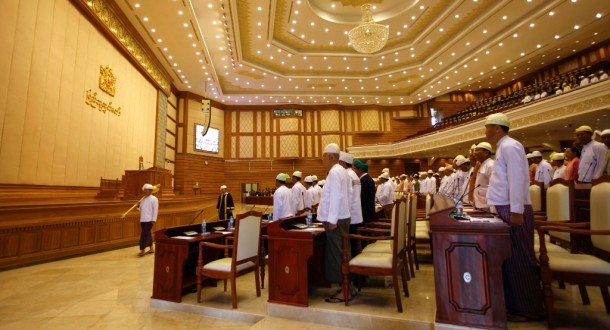The Union Parliament has approved a development fund bill that will allot 100 million kyats (US$102,000) to each of Burma’s 330 townships annually, with the legislation set to become law despite President Thein Sein’s objection to it earlier this week.
The President’s Office has been against the plan since it was first proposed last year, but lawmakers pushed the legislation through over his objection on Tuesday.
Though it had not been put to a vote until this week, parliamentarians had already in effect been implementing the bill’s provisions since the end of 2013, using funds allocated for the 2013-14 fiscal year. The undertaking of small-scale development projects is intended to improve the country’s stunted social, health and education sectors at the local level. The total 33 billion kyats budget will be available for use each fiscal year.
A letter from the President’s Office to Parliament, also on Tuesday, stated objections to more than 10 sections of the bill, insisting that “the new law would allow for legislative intervention in the executive’s works,” according to legislators.
“We have contrary thinking,” said Thein Nyunt, a lawmaker from the New National Democracy Party. “We, the parliamentarians, view the projects as enhancing collaboration between the administrative and legislative branches.”
It is not unusual for Thein Sein to have disagreements with parliamentary proposals, but Lower House legislator Phay Than defended Parliament’s disregard for the president’s concerns by saying, “it is our duty to enact such laws in the public interest.”
The Thein Sein administration has initiated its own program of “people-centered” development projects, funded out of the budgets of a handful of ministries and administered by local authorities. The program targets “most-needed projects” and does not offer a role for Union-level lawmakers whose constituencies benefit from them.
An official from the President’s Office, who asked to remain anonymous, said that although the president accepted the parliamentarians’ aims “in principle,” Thein Sein objected on the grounds that the development fund would “overlap” with the plans of his administration.
Lawmakers counter that the development initiatives they support are spending no more than 5 million kyats per project, and consist of improvements to electricity access, road and bridge repairs, school buildings’ renovation and provision of clean drinking water.
These small-scale projects are not included in the ministries’ budget plans, lawmakers say, and represent unmet needs for their constituencies.
“The impoverished people gain benefits from the projects,” Thein Nyunt said, listing efforts to improve sanitation, renovate public buildings and improve local water supplies as among the benefits that had already come out of the development fund and would not have been funded otherwise. “It is like an emergency fund that aims to fill these gaps.”
Ba Shein, a member of Parliament’s Bill Committee, said “Parliament performs its duty to make laws that will benefit the public. There is no restriction in the Constitution that we cannot create laws.”
According to Article 106 of the Constitution, the bill will become law—whether the president signs the legislation or not—one week from its passage.
Parliamentarians in support of the bill remained adamant that the fund would help people in need while also aiding the government.
“It seems the administrative body still wants to manipulate, as in the past,” said Ba Shein, adding, “Within the three years of the country’s transition period, the actual changes have not yet taken place. The government thinks the country’s development is moving forward, but if you look at the ground level, the actual movement is just a tiny bit of an inch. This is why we want to do our part to make the move quicker and faster.”
Hla Swe, an Upper House lawmaker from the ruling Union Solidarity and Development Party (USDP), said the fund should be considered a means of improving the efficiency of government spending as well.
“It is a worthy law because the funding of 100 million kyats per township could save another 200 million for the government, because the small-scale development projects will be done at cheaper cost than those working with municipal departments or the Construction Ministry. Our projects are done with much public support, where they [beneficiaries] volunteer in terms of their physical or material services.”
Under the development fund, MPs and local township administrators collaborate in carrying out each project. The MPs head Township Development Implementation Committees and township administrators manage the projects.
“We oversee the projects’ implementation and we are not in control of financial management. That is the job of the township administrators,” explained Phay Than.
In addition to Thein Sein’s concerns of overlapping authorities, others contend that MPs are using the development fund to their personal benefit, in what amounts to buying votes from the public ahead of elections in 2015.

















